For some of us, expat living wasn’t necessarily a conscious plan.
For others it might have arisen out of a need for dramatic change in our lives. Even retirement is a life changing event, where the urge or necessity to reinvent yourself finally becomes stronger than the desire to remain safe and secure in your present circumstances.
I have always had a love of travel and change, but I think my latest lifestyle choice took all my friends and family, including me, by surprise!After surfacing from the breakdown of a long term relationship, I’d worked hard to get myself back on track by making some hard decisions. I transitioned from owning my own business and living comfortably in the beautiful countryside of Wales, UK, to working for a company in cosmopolitan London.
I had secured a new job with great prospects, in a great location on the Southbank of the Thames. I found a new home, and a new circle of friends – that should have been enough of a life change, surely?
Little did I know this was just the interim phase of a much larger plan that was shortly to unfold.
My current partner, Ian, was introduced by a friend, as he passed through the capital on the way to his island home in Central America. A former Brit, he had moved to Panama where he had created an off-grid island home in the archipelago of Bocas del Toro.
An itinerant traveler and adventurer, Ian had researched where in the world he could live most cheaply within his budget. At that time Panama met his lifestyle and financial criteria, and during a fact-finding visit, he surprised himself by putting in an offer on a small private island.
The island was surrounded by mangroves and covered with jungle, but there was good line-of-sight boat access to Bocas Town. At $27,500 US it was difficult to resist and so it seemed was Ian’s offer. Within a few days he was the unexpected owner of his own Caribbean island.
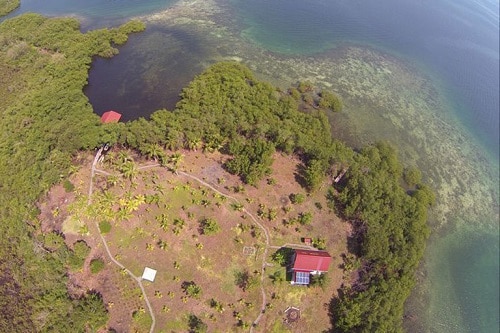
On our one evening in London we really hit it off and swapped email addresses. We were both still dealing with fallout from our failing relationships. Through a series of back and forth correspondence, we provided support to each other during these challenging times.
Eventually, with all personal issues behind us, we found ourselves progressing to long phone chats across the Atlantic divide.
It was time for a holiday!
Four months after our first chance meeting in London, I found myself agreeing to a holiday and headed out to meet Ian in San Jose, Costa Rica. From here he gallantly escorted me down and across the border into Panama, and onward to his water-based expat lifestyle in Bocas.
I had spent time before in Mexico, but this was the first time I had experienced such a remote Central American jungle environment. Howler monkeys provided the early morning wake-up call, and most properties were hidden far from roads, towns or cities, accessible only by boat. Even the small tourist town of Bocas is an island, and the tiny port of Almirante is the only road link to the outside world.
It was both intriguing and a little unnerving.
Over 2 years Ian had worked with a small team of indigenous Indian workers to clear his 2.2 acres of jungle vegetation, to create a safe harbor and jetty for his boat. He built a small two bedroom house with a separate storage bodega, and was encouraging small clumps of tropical grasses to take root all over the island among the newly planted coconut palms.
I had seen images of the isle when he bought it, and it was amazing to see the transformation as he skillfully maneuvered his small speed boat between the coral reefs and into the dock.
Campesino, the island dog and Head of Security, was waiting on the end of the jetty with wagging tail as we arrived. He chased us excitedly as we advanced along the slightly submerged stone pathway to the small wooden built house that was to be my home for the next two weeks.
As it happened, things between Ian and I went well, and as the end of the holiday approached I had already made up my mind to stay – permanently. Of course I would have to return to the UK at some time to tie-up loose ends, but for now I was sure that this was where I should be.
I was about to become a traveling citizen of the world – a nomadic expat – and my first layover was a year in Panama.
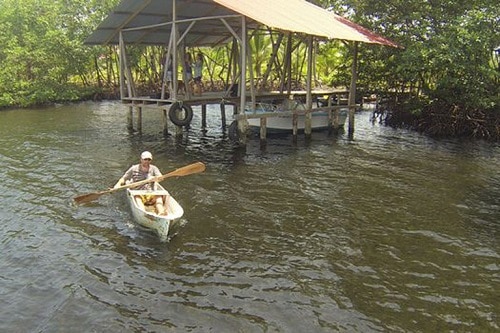
Acclimatizing to a water-based lifestyle in the tropics
The first thing that struck me was the heat and humidity. It was extremely hot and the mangroves barred the way for the sea breeze that was so close, yet unable to penetrate through the mish mash of roots, to the house. It quickly became clear that the weather dictated the pace of life here, and slowing down was very much the order of the day.
There is a thriving expat community in Bocas de Toro, which comprises not only US and Canadian citizens, but also Brits and Europeans. Most of the properties are remote, off-grid and accessible only by boat, so living here requires a challenging mix of expat skills, especially if waterside and off-grid living is new to you.
In and around the smaller islands and the more remote areas of Tierra Oscura (The Darklands), nothing much happens socially after dark. Getting around by boat is not always that easy during daylight hours as the mangroves become confusing barriers to navigation. They merge dangerously, disguising any former access through the small cuts that provide short cuts and routes back home.
The water is often shallow and it’s not unusual to hear of boats that end-up stranded on sandbars or coral reefs when safe routes haven’t been followed and observed. After dark the dangers are amplified, and without lights and navigation equipment it’s likely you could spend a long night lost in the mangroves, eaten alive by “chitras” – the tiny, almost invisible sand flies that are the curse of many a new expat in this area!
Social bonding in the jungle
Many expats in Bocas do live remotely and have fairly private lives, sometimes going days and days without seeing another person. So when expats party there, they party hard! Potluck dinners are common, and groups of expats will meet up at local jungle restaurants and small resorts for afternoons of drinking, chit-chat and dancing! I loved the social side of living in Bocas and enjoyed getting to know people from all walks of life, who had come together to experience this small tropical paradise.
Remote living in this way bonds people, and I have never since experienced the same level of community support that I witnessed in the Bocas archipelago. Internet and mobile phone signals were often unobtainable in the more distant regions, and so a VHF radio network was established for the community to stay in-touch. More importantly it was a way to communicate and get help during an emergency. It is shared with the boating community, who often spend long months in Bocas riding out the hurricane season.
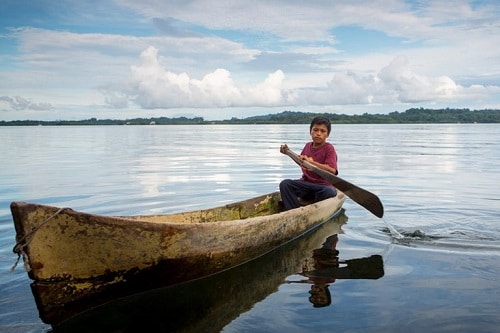
Every morning there is a hosted radio program in which expats can participate. We took turns at becoming radio presenters, and enjoyed preparing the weather forecast twice a week. People create their own entertainment here and a number of activities can be enjoyed. On our last visit back this year as house sitters, we joined a philosophy group and had some great afternoon debates at a local jungle pizzeria over a shared lunch and a few beers!
Shopping challenges
Boat fuel is expensive and so expats living close to each other would often take turns to ferry a group to an afternoon gathering, or even into town for shopping. Shopping days were typically only once a week or even every 10 days, and so needed careful planning.
This trip would involve trips to the local Chinese run supermarkets in Bocas Town, changing out propane gas bottles, bulk purchases of two essentials, drinking water and beer, and refueling the boat. You might also need to schedule a visit to the “ferreteria” for maintenance items. There is no public dock in Bocas, so expats often make arrangements with particular restaurants, or stores where they can tie up their boats for these expeditions.
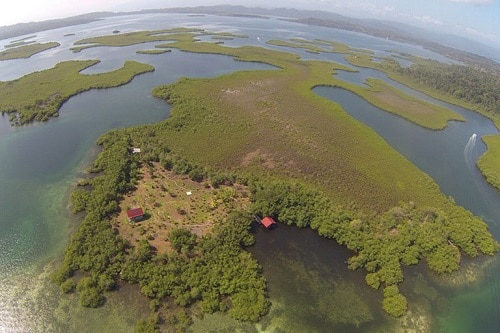
For anything close to resembling an American style supermarket or furniture store, you would need to travel into Changuinola, or even further afield by coach or car to the city of David. Always you had to consider how you could transport your purchases back home by boat. But living in this way makes people resourceful, and there’s a handy truck service that an entrepreneurial expat has set up to deliver your bulkier purchases all the way from the city to the boat dock in Bocas.
Life in Bocas can be a challenge where sometimes it feels like everything is conspiring against you – the weather, the bugs, communication and ongoing repairs. Sometimes there isn’t enough water, sometimes it rains for days on end. But it is also tranquil, beautiful, and sublime. The local indigenous Indians welcome Gringos and other immigrants from around the world. It is considered a safe area by Central American standards, and there’s a wealth of wildlife – flora and fauna – to be discovered.
My first introduction to house sitting
While living in Bocas I first came across the term “active recycling”. Ian explained how the indigenous Indians had no real concept of vacations, and so if a gringo went back to the US for a couple of months during the wet season, it was perfectly feasible for the locals to think they had vacated their house for good. And so “active recycling” could begin. This involves the slow removal of your home, piece by piece, to be reused in a building project elsewhere. If you witnessed a dock being disassembled, you knew that nothing much remained on the property!
For this reason, expats use house sitters extensively to look after their homes, possessions and pets, while they return home or travel to neighboring countries for visa renewals.
It’s pretty much word of mouth in this area because there are so many necessary skills that are required to maintain an off-grid home. Of course, boat skills are also a necessity and often hard to come by. We had friends who were permanent house sitters, moving periodically from one property to another, completing assignments in different areas of the archipelago.
After a year of living on the island, Ian and I were keen to continue on our nomadic adventure, and it occurred to us that house sitting might also be a way that we could experience different cultures in other locations around the world.
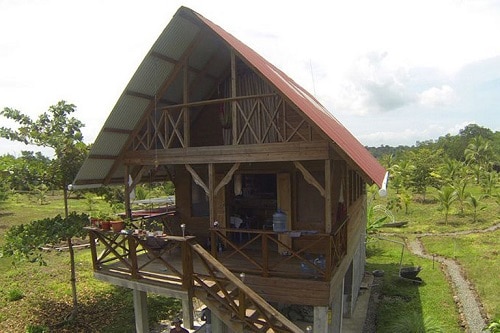
Ian had been used to leaving the island for months at a time, and had used a number of different house sitters, so the concept was not new to him. Sailors often welcome a week or two on land, and we gave a young family the opportunity to spend time on dry land. Sailors also understand the principle of off-grid living and so often make perfect house sitters in these situations.
I had no idea that there was such a thriving community of sitters who were happy to exchange their services of pet and property care for free accommodation. This sounded like the perfect way to facilitate a nomadic expat lifestyle.
To get some experience, and gain all important references, we offered our own services to friends for one or two nights at a time – allowing them to take short breaks in nearby resorts, or to visit mainland cities. We could easily leave our property for short periods, watched over by our local worker and Campesino – he was an excellent guard dog.
Things progressed nicely from there. I started doing some research online and came across a house sitting course run by a couple of long term house sitters, Nat and Jodie, of House Sitting Academy. This seemed like a great way to accumulate not only as much knowledge as we could about house sitting, but more about how to do it successfully. We then sought out one of the larger online platforms, Trusted Housesitters who offer a reference backed match making service for home owners and house sitters.
We signed up and haven’t looked back since. Ian put the island up for sale (it’s now sold), and we set off to the US on the start of our new lifestyle. We have now house sat in Panama, the US, UK, Australia, Fiji, Mexico, and Nicaragua. This year we will be house sitting in Mexico, Botswana, Barbados and Australia. The year after, we are already booked to look after a small development of rental properties on the Caribbean island of Grenada.
We enjoy our nomadic expat lifestyle and the freedom it affords us. We know that if we settled and invested in property again at this stage in our lives, we’d soon become bored and long for change. House sitting gives us the opportunity to both live like a local, for months at a time, but more importantly it curbs our itchy feet issues!
Do you think house sitting could help add variety to your expat lifestyle?
